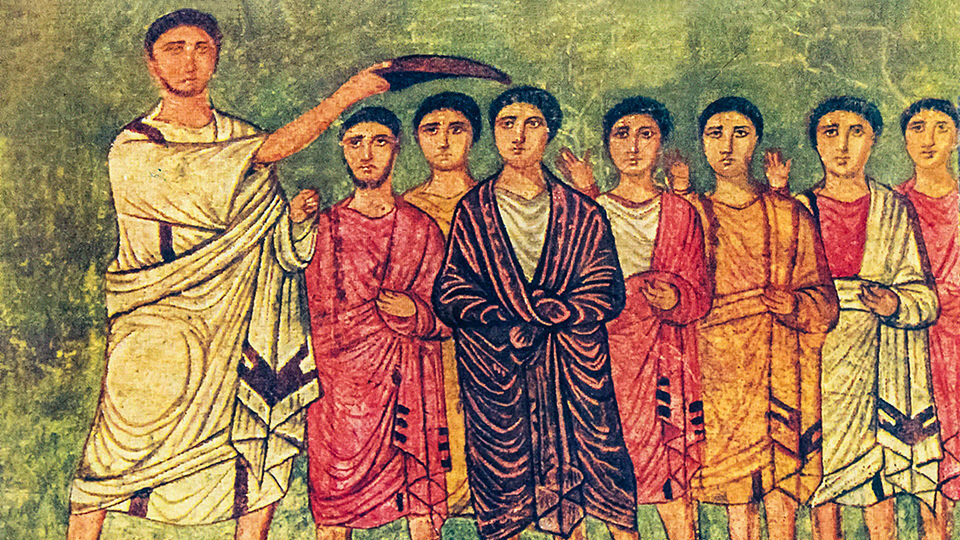

A King among his sons | Reflection for the Fourth Sunday of Lent
Matthew Neugebauer
Saturday, March 18, 2023

David anointed king by Samuel, Dura Europos Synagogue. Wikimedia Commons.
1 Samuel 16.1b, 6-7, 10-13
The reign of King Saul was an unmitigated disaster. It was full of rash, vengeful decisions. Perhaps the worst was his presumption to lead a Sacrifice himself – something that only priests or prophets were allowed to do – just to get on with a battle. (1 Samuel 13:8-15). Another “very rash act”: he later made his troops go without food until he had "avenged [his] enemies." (14:24) No wonder God "regretted making Saul king," (15:11) and Samuel "grieved over Saul." (16:1a)
Thankfully, God is more than capable of taking matters into His own hands. In our reading for this coming Sunday, He tells Samuel, "I will send you to Jesse of Bethlehem, for I have provided for myself a king among his sons." (16:1b) The story proceeds along the pattern of a children's fable: Samuel goes to Jesse, who presents his sons to the prophet one by one, beginning with the eldest and most capable, Eliab, then Abinadab, then Shammah. Then, the next four. All of them are deemed worthy candidates by Samuel, but none of them are chosen by God.
The number seven – such as the number of sons that Jesse presents to Samuel – often signifies in Scripture the completion of the natural world and all that it has to offer. The sequence of days in Genesis 1 is probably the best-known example, envisioning creation as a complete work of God. Jesse’s parade of seven sons also exemplifies the best that this created world has to offer. Again, they're all good candidates for kingship, for leadership and power, at least according to our normal way of doing politics, according to what “the human sees.” (16:7) The author singles out the eldest three by referring to their names, and later tells readers that Eliab, Abinadab, and Shammah are strong and experienced soldiers capable enough to “follow Saul to the battle” against the Philistines. (17:13)
King Saul: All that the world has to offer
Saul was also a great candidate as king, at first. He came from a wealthy family, (9:1) confidently led multiple battles, (14:43) was young and attractive, and literally “stood head and shoulders above everyone else.” (9:2) He represented the best conventional option that the world had to offer, and therefore all that it had to offer. His unlawful sacrifice characterizes the failures of his kingship. Normally before a battle, the priest or the prophet would come to make a burnt offering to God as a way of devoting the success of the nation to God's strength alone. However, Saul was eager to rush into a prior battle with the Philistines and claim the glory for himself, and refused to wait for Samuel to come and celebrate the ritual. He protested that "the people were slipping away" from him, (13:11) perhaps afraid they were losing courage for battle, and confidence in their king's leadership. Saul took matters into his own hands, and presumed to do what only a priest or prophet was set apart to do. Worse than that, he presumed that what he could provide by himself was enough to secure the strength and safety of the people. The well-being of the people was God's purview, and the role of the king was to follow God's commands in seeking the people’s welfare. I can imagine both the pressure of taking on God's job as the people’s defender, seeking the honour and glory that comes from this divine role, the constant disappointment and frustration at constantly failing to do it, and at heart the despair and bitterness at being rejected by God for his presumptions, all took their toll. He ended his reign full of rash, vengeful choices, and succumbed to toxic arrogance that inevitably marks our sinful, human conceptions of power and control.The Good Shepherd
So God moves on from Saul, and instructs Samuel to do the same. The natural order is good when the people in it seek to be faithful to God, but alone it simply isn’t enough. God didn’t set up the universe and then abandon us to our fates. God remains close and tender, and when things go south, God takes matters into His own hands and ensures the well-being of the people. He intervenes with grace and insight, and provides for Himself a king among Jesse's sons. When God takes matters into his own hands, however, His action exposes our own preconceived notions even as He takes on the work of healing and restoration. The son God chooses isn't automatically given pride of place, but sent to do grunt work like providing food for his brothers, (17:17-18) and "keeping the sheep." (16:11) God chooses a son who suffers the indignity of the margins, of being considered so unfit for anything special that Jesse, the father of the natural order, doesn't even think to present him. For that son to become king would be a shock to the system. It would flip the tables upside down. Of course, that is what happens. Samuel anoints David the next king of Israel, pouring oil on his head, and placing the hope of reversing Saul's disaster on his shoulders. David goes on the run from Saul and has to wait a number of years, but ascends the throne after the king dies. David’s reign is a qualified success: for the most part (but not the whole part), he keeps the nation together, and preserves their faithful worship of God. That unity and true worship wouldn't last forever, but centuries later the people would see his reign as a symbol, a promise that God would again provide for himself a king from the “root of Jesse” – a descendant of David. (Isaiah 11:10) They would trust in the promise God made to David early in his reign, that his “throne shall be established for ever.” (2 Samuel 7:16) They would ultimately look to this new king as the final expression of God's own gracious intervention into human history. (See Isaiah 11, Daniel 7:13-14, Revelation 12:16, and Matthew 21:9 – the Gospel for the Palm Sunday procession.) Christians believe that God has indeed acted, has once again graciously intervened by providing a King for His people from among Jesse’s sons. He has provided a King who goes "beyond the seven," beyond the natural order. He is born of a Virgin, in God's own eternal wisdom, and reigns in the power of that very wisdom. He gives food to the hungry, and faithfully keeps the sheep by putting them “at his right hand and the goats at his left.” (Matthew 25:33, Gospel for the Feast of Christ the King) He is a King who suffers the indignity of the margins, finds the lost sheep, flips the tables of power. He is a King who transforms the world through “foolishness” of the cross and grave, (1 Corinthians 1:18) and the victory of the empty tomb. Jesus, son of David, son of Jesse, reverses the disastrous reign of sin and death. He gathers all nations into the Communion of his Church, "breaking down the dividing wall" (Ephesians 2:14) that we built by our prejudices and presumptions. He shows us the humility of the shepherd who smells like the sheep, by coming close and comforting those on the margins. He shows us that this humility is the way of God's very power among us, very presence among us “to hold and lead, his hand to guide, his shield to ward.” God has indeed provided a King from among Jesse's sons. He has provided Mary's Son, His own Word made Flesh.Related Articles:
>>
SUPPORT LABEL
$50
$100
$150
$250
OTHER AMOUNT
DONATE
Receive our newsletters
Stay Connected
Receive our newsletters

Stay Connected









